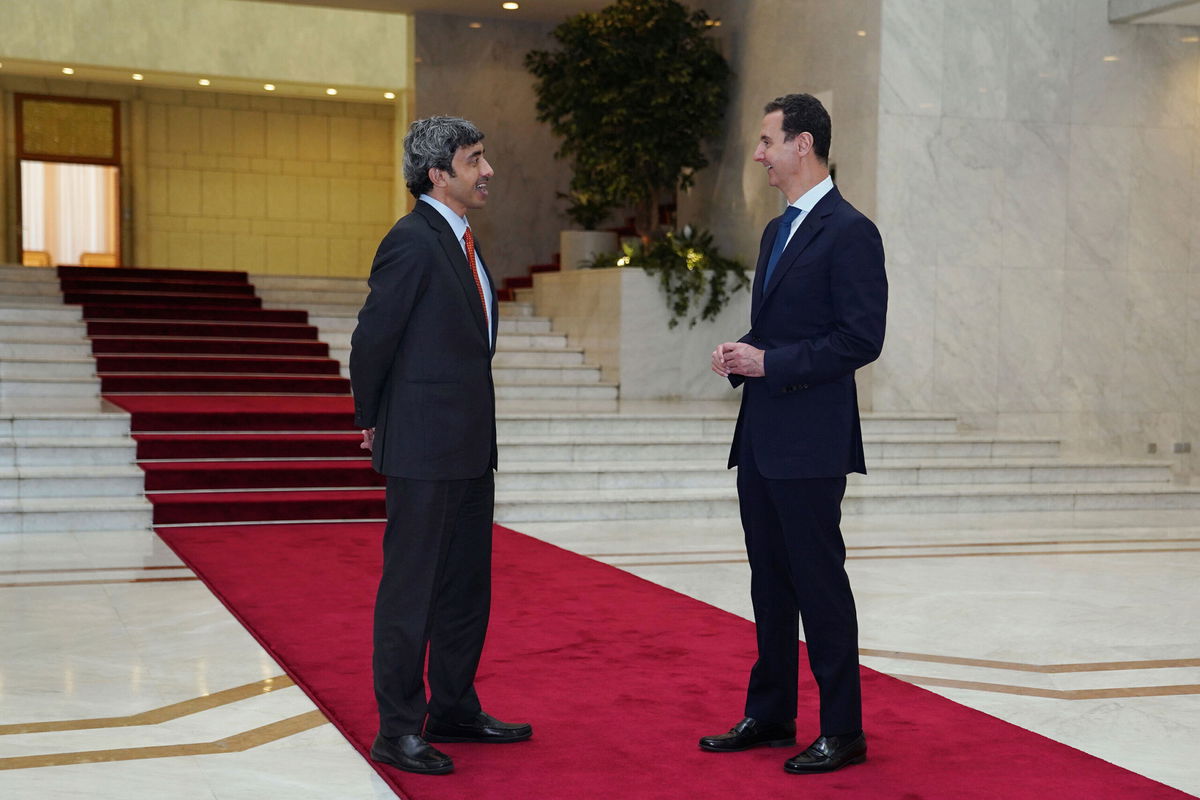UAE foreign minister meets Assad, in highest-profile Emirati visit to Syria since start of war

Syrian leader Bashar al-Assad (R) meets with the UAE's Foreign Minister Sheikh Abdallah in Damascus on Tuesday.
By Tamara Qiblawi and Mostafa Salem, CNN
The United Arab Emirates Foreign Minister Sheikh Abdallah bin Zayed met Syrian President Bashar al-Assad in Damascus on Tuesday, in the most senior Emirati visit to the country since the start of Syria’s war in 2011.
The visit is the biggest signal of a normalization of regional ties with Assad’s government since the Syrian dictator’s brutal quelling of a popular uprising prompted his diplomatic isolation. It is also the most high-profile meeting between Assad and an Arab official since former Sudanese President Omar al-Bashir flew to the Syrian capital several days before his ouster in 2019.
The UAE’s top diplomat discussed developing “bilateral cooperation in various fields of common interest and developing cooperation” between the two countries, according to the Syrian presidency statement.
Assad also thanked the UAE for their support “in overcoming [Syria’s] challenges imposed by the war.” The Syrian presidency statement cited Sheikh Abdallah as saying that “what happened in Syria affected all Arab nations.”
Sheikh Abdallah has been a vocal opponent of a US sanctions regime against the Assad government known as the Caesar Act. In 2018, the UAE reopened their Damascus embassy, helping spearhead a regional bid to reintegrate the Syrian government into the regional diplomatic arena.
The move to normalize regional ties with Damascus has encountered resistance from the US and other Western countries who fear that ending Assad’s isolation would empower the Syrian dictator and reduce any chance of accountability for his alleged war crimes and crimes against humanity. The Assad government denies those charges.
But while official Western policy towards Assad’s government remains unchanged, opposition to normalizing ties appeared to wane over the last year. Washington has tacitly approved a new gas pipeline to Lebanon which aims to alleviate the country’s crippling fuel shortages but runs through Syria, violating the sanctions campaign against the Assad regime.
Washington has also largely refrained from publicly criticizing recent Arab diplomatic overtures to Damascus.
“His Highness in Damascus paves the path for the return of Syria to the Arab embrace,” tweeted prominent Emirati analyst Abdulkhaleq Abdulla along with a photo of Sheikh Abdalla.
In recent years, Abu Dhabi has emerged as a major power broker in the crisis-ridden region and moved to mend ties with traditional foes. In August 2019, the country normalized ties with Israel, and it has also sought to repair a strained diplomatic relationship with Iran.
The-CNN-Wire
™ & © 2021 Cable News Network, Inc., a WarnerMedia Company. All rights reserved.